Cauldron of Fire (Blood on the Stars Book 5) Read online
Page 35
“Stay where you are, Coop. Don’t even think about going in there until we get through to you. If you get a shot at these guys in the hall, take it.”
“Got it, Sarge.”
Hargraves fired another burst and then ducked back into his makeshift cover. He’d been in fights like this before, and he knew a standoff like this could last for hours…or at least until somebody ran out of ammo. His people didn’t have that kind of time, and the longer they were bogged down the more chance the enemy would get reinforcements. He knew he had to do something, now.”
He held the comm to his mouth, speaking softly. “All right, listen up. On three, we’re all rushing that position. Just push forward full speed, firing every step.”
He popped the clip in his rifle, replacing it with a fresh one. “One.”
He took a deep breath and exhaled. “Two.” Rushing an enemy in cover was his last choice of tactics…but it was also his only one right now.
His rifle was tight in his hands, and he lunged forward, just an instant before he said, “Three.”
He stumbled down the hall, his momentum taking him forward and to the left. He fired, and then again as he caught a glimpse of one of the enemy troopers. He saw a spray of blood, and then the shadow of his enemy’s body falling. He heard a sickening thud as it hit the ground.
Fire tore down the hallway, and he saw as one of his Marines fell forward, his left leg giving out as a pair of shots came close to tearing it off.
Hargraves was still moving, though he could feel himself stumbling forward, his momentum pushing through his balance. His rifle continued spitting out rounds on full auto, ripping into the fine paneling of the walls, sending shards of wood flying everywhere. Another enemy trooper fell victim to his assault, dropping hard into the center of the hall.
He tried to right himself, to keep up on his feet, but the strength in his legs failed him. He fell to the ground, landing on a long, ornate carpet, and gasped for breath, feeling a sharp pain in his side as he did. He reached down and then pulled up his hand. It was covered with a sheen of bright red blood.
He’d been wounded before, almost more times than he could recount, and he knew almost immediately this was serious. But he didn’t have time to be out of action. Not now. He tried to get up, but he couldn’t, not until he felt a hand on his shoulder, helping him to his feet.
He wobbled as he stood, gritting his teeth against the pain. He glanced to the side to see Hursus standing next to him, the Alliance soldier’s hand still on his shoulder. He nodded his acknowledgement, and then he moved slowly forward, limping.
The Alliance troopers were all down, and a small group of his and Cooper’s Marines were clustered outside the doorway. He made his way forward and looked inside.
There were two children, a boy, perhaps twelve, and a girl two or three years younger. They were sitting on the edge of a bed, the boy leaning forward in front of the girl, holding a knife. Two adults, a man and a woman, were standing on the opposite side of the room, both holding guns pointed at the children. There was an old man in between, clearly trying to shield the kids with his own body.
“This is your last warning, old man. Get out of the way, or you die too.” It was the man speaking. He turned to his companion. “Vilia, cover the door.” Then, turning slightly toward where Hargraves and his people stood, “Stay back, all of you. One move, and we open up.”
“You’re trapped in here,” Hargraves said, struggling more to get the words out than he’d expected. “Drop the guns, and we won’t harm you. We’re just here for the children.”
“I said stay where you are. And who’s trapped? How long do you think it will be before this house is surrounded?”
Hargraves could see the old man, his eyes darting back and forth.
“Imperator Vennius sent us for the children. We have no quarrel with you,” Hargraves’s voice was strained, but still threatening, “but we will kill you if you force us to.”
Hargraves caught an odd look in the old man’s face, as if he’d been trying to come to a decision and finally had. Barely a second or two later, he turned directly toward the man who had spoken. He pulled a small pistol out from under his shirt, and brought it to bear. Even as he did, the man and woman opened fire. Hargraves could see the impacts, four shots taking him in the chest, throwing his frail body backward toward the bed. But not before his pistol fired. A single shot.
Hargraves snapped his head around, watching as a large red circle appeared in the man’s head. The old man had sacrificed himself to save the children, his shot perfect, dead on. Hargraves reacted immediately, instinctively. He would see the man’s sacrifice was not in vain.
His hand snapped up, bringing one of his pistols to bear, even as two of the other marines opened fire. The woman had started to speak, and Hargraves thought she might have been trying to surrender…but it was too late. Her body was riddled with bullets, and she crashed into the far wall, falling dead to the ground.
The two children leapt off the bed, rushing to the crumpled body of the old man. The boy kept his knife pointed toward Hargraves and the Marines, looking as though he intended to defend the man against them. Hargraves opened his mouth, but before he got anything out, the old man muttered, “Go with them, Lucius, Ariane. Your Uncle Tarkus sent them to save you.” The voice was weak, frail, and Hargraves could hear the gurgling sound of blood in the man’s lungs.
“We can’t leave without you, Yuricus. We won’t.” The boy reached down, put his hand behind the man’s neck, pulling his head up. But there was no response. The old man was dead.
“You two have to come now. We’ve got transport coming, but if we don’t get out of here now, we never will.” Hargraves looked up at Hursus. “Take them,” he said, wincing again in pain. He watched to see if the children resisted as the trooper put his hand gently on their shoulders, guiding them toward the door. They didn’t.
Hargraves turned to the entire group, wobbling on his feet and catching himself on the edge of the bed. “Let’s get the hell out of here.”
* * *
“I want those positions manned right now.” Bryan Rogan was yelling into his comm, the urgency of the situation clear with every word he spoke. His people had taken the primary targets, somehow. He’d almost given up for a few minutes, but his people had pushed forward, beyond endurance, beyond reasonable expectation, and once they’d taken the main line of defenses it had become a turkey shoot, his enraged Marines chasing down every now-exposed enemy survivor they could find.
Rogan didn’t approve of casual brutality, and he’d ordered his Marines to take prisoners of any enemy troops who surrendered, but he wasn’t surprised when no live Reds were rounded up. He couldn’t fault his people, not knowing the ethos of the Alliance. You couldn’t mandate taking prisoners from an enemy who rarely surrendered.
“Yes, sir. We’ve got all approaches covered…but, sir, we’ve got multiple sightings of enemy troops inbound. I’d say we’ve got a massive counterattack forming.”
Rogan cursed under his breath. He’d had similar reports coming in from all across the line. He knew his people would have to defend the ground they’d taken, but he’d hoped to have longer to prepare. His forces had blasted the makeshift defenses relentlessly when they took them, and he needed a day, twelve hours, at least, to get them back into some semblance of shape.
But it didn’t look like he was going to get it. He stared at the portable scanner his aide had just set up. Things were worse than he’d thought. There were thousands of Red troopers, approaching from all around his perimeter.
“What’s the status of that comm link?” He turned toward the engineers working on the electronics panel behind him. The main Alliance communications nexus had been his number one objective, the sole point Barron had labeled as essential. The Marines had taken it, along with all the others, but the equipment had been pretty badly shot up in the fighting.
“We’re working on it, Colonel. The Alliance systems don�
�t work the way ours do.” A pause. “We’ll get it back online, sir.”
“As soon as possible,” Rogan said. Then he looked at the screen again. There’s no way we’re going to hold back that attack, not without more time to dig in. He pulled the comm unit from his belt and stared at it for a few seconds. Commodore Barron had sent him down here to do a job…and now he had to tell his commander that he was going to fail.
“Dauntless, this is Colonel Rogan. I need to speak to the commodore.”
“Hold, Colonel.” Rogan recognized Commander Travis’s voice.
“Colonel, report.” Barron came on the line within a second or two.
“We’ve taken all major objectives, sir, but…” Rogan was as no nonsense a Marine as the Corps made, but he was having trouble telling Barron his people weren’t going to hold what they’d taken, at least not for more than an hour.
“Speak, Colonel. Give it to me straight.”
“We’ve got a major counterattack forming, sir. Thousands of troopers, and I’m betting they’re first line types. We’re digging in, but we haven’t had enough time. I don’t think we can…” Rogan’s eyes caught the scanner again, the huge groups of enemy troops gathering together. They were formidable for sure…but they were also forming up out in the open. “Sir, if you can launch another fighter strike…they’re all out in the clear. If we can hit them quickly enough…”
“On the way, Colonel. You and your people just do what you can. Help is coming.”
Chapter Forty-One
UWS Banniere
Formara System
Year 62 (311 AC)
“All ships are to continue to advance at full thrust!” Villieneuve had his hands on the back of Mies’s chair, hovering over Banniere’s captain. His elation at the trap he’d sprung had given way momentarily to anger. “I want those ships destroyed!” His superweapon had earned its keep, justified every resource he’d poured into acquiring it. The makeshift power facility his technicians had put together was another matter entirely. The weapon had taken down seven enemy ships, four destroyed outright and three crippled, gutted. But the power feeds kept giving out, shutting down the superweapon’s fire while emergency repairs were made. His engineers had warned him they needed more time to complete their work, and he had to admit they were repairing things in almost astonishing time, but still, he was furious. Seven destroyed Confed ships should have been twelve, and now he’d lost two of his own vessels as they moved toward the enemy, running the gauntlet though the Confed’s deadly primary battery range.
“Yes, Minister.” Mies was just Banniere’s captain, but Villieneuve’s presence made her a sort of staff officer to the entire fleet. The head of Sector Nine didn’t hold a position in the naval hierarchy, of course, but no one would refuse his command. He’d learned his lesson earlier in the war about trusting too much power into any single officer’s hands, and the combined fleet was commanded by three different admirals, each in their own ships. Militarily, he knew it was a cumbersome structure, and tactically inefficient, but the last thing he needed now was a naval hero with visions of political power. It was another reason he was there, at the front in Banniere. If someone was going to be revered as the hero of the Union, it was going to be him. He didn’t crave the adoration, but he couldn’t dispute the political utility of it all.
He had every reason to be pleased, to rejoice in the great victory his arms had won…but now his eyes caught the enemy rearguard, and the columns of ships behind them, moving steadily through the transit point. Every Confed ship that escaped was one he’d have to fight another day. He’d never expected to bag the whole enemy fleet—Striker was too smart for that. But the initial phase of the battle had gone so well, he’d gotten greedy. He’d had images of pursuing a crushed and broken force, his own fleet winning the war, in the next system…or the one after that. But that wasn’t going to happen. The Confederation fleet would be battered here, hurt badly. But it would not be destroyed. And his deadly weapon, the tool that taunted him with the promise of total victory, was stuck, unable to pursue its prey and complete its work of destruction.
At least until his engineers managed to do as he’d charged them to do. His face tightened. They would build some kind of structure to move the Pulsar, no matter how much pressure he had to put on them, how many dire threats he need to hurl their way. And they would do it quickly. There was no more time. The Union was on the verge of collapse, its economy utterly devastated, unrest building on dozens of its worlds. It was time to win the war…or lose it. And which it would be hinged on whether he could turn his superweapon into something mobile…and bring the war to the enemy.
* * *
“The left flank has begun transiting, Admiral.”
Hogan’s words were a fleeting solace to Striker in his misery. At least some of his ships would escape this deathtrap…the one I led them to.
He knew he’d had no choice, that he’d been expressly ordered to do as he’d done. In a Senatorial chamber, testifying before the miserable band of politicians who’d sent his people into this nightmare, he’d have proclaimed it loud and clear, laid the blame at the feet of the pompous fools. But sitting on Renown’s bridge, watching his people die, it sounded like an excuse. Those men and women being burned and crushed and blasted to bits had followed him here…and they would blame him for what had happened. But none of them would blame him with more bitterness than he did himself.
“Admiral, we’re getting requests from fighter squadrons all over the task force. They are requesting permission to launch.”
Striker stared at the display, at the waves of Union strike craft approaching his wavering line. There were hundreds of fighters, and a second line that looked very much like bomber squadrons. He could only imagine what they would do to his ships unopposed. But he’d held back from launching his own fighters. He knew full well, sending a pilot out there was a death sentence. As soon as the other ships had transited, his rearguard would make a run for it…and there would be no time to retrieve fighters.
We just might make it out ahead of those bomber squadrons…
He’d sent his people into deadly situations before, and, he had to admit, more than one nearly suicidal mission. But ordering his fighters out when he knew without doubt that he was sending them to their deaths…could he even make himself do that?
“Volunteers only, Commander. Each ship may launch volunteers, but only up to one-fourth of their complements.” He hated himself as the words came out of his mouth. He knew the roster would be full on every ship, even oversubscribed. And he also knew those doomed pilots might hold back in the incoming assault wave…maybe even just long enough.
He turned toward the far end of the display. His battleships were moving through the transwarp point. They were almost on top of each other, far closer than safety regs required. But regulations weren’t important now. Whatever escaped from this trap would be the Confederation’s sole defense, and Striker would do anything that got more of his people out.
He saw the escort ships clustered around the portal. Not one of them would transit before the battleships had all gone through. The big motherships were the heart of the fleet. They had to survive. If that meant a few dozen escort vessels and their crews had to be sacrificed then so be it.
His eye caught the clouds of tiny dots, his doomed squadrons launching. The math was simple—if the fighters could hold back the enemy attack long enough to save even one more battleship, it was worth it. But there was more to this equation than simply numbers. These were loyal officers, pilots who had served faithfully, and who now were giving all they had left.
There was another flash on the display. The enemy’s big gun was firing again. This time it was Monarch. The old ship took a hit amidships. She hung in space for a few seconds, and then she disappeared in a massive explosion.
Striker almost looked away. No, he said, holding his head firm. You owe it to them to watch, to see.
Renown’s bridge lights blinked agai
n as her quad primaries fired. Striker turned his head to the targeting screen just as the heavy particle beams slammed into a Union battleship. The vessel was badly damaged already, and the direct hit proved to be too much. It didn’t explode…the reactors scragged instead of losing containment, but the scanning reports quickly confirmed Striker’s guess. It was dead.
That’s three…and we’ve lost nine, counting the cripples that will never leave this system. And we’re still in the fight.
He felt anger building toward the politicians who’d ordered him into this disastrous invasion. How many men and women would die here because of their ill-conceived action? Will it be enough to cost us even our defense? Will the Confederation fall because of their foolishness?
He saw another bright light on the display, the enemy weapon firing again. A clean miss this time. He let out a deep breath, thankful for the salvation of another thousand of his people. At least for a few moments.
“Admiral, the right wing is going through, and the escorts are lined up behind.”
Striker turned and looked, confirming what his aide told him.
“Very well, the rearguard will pull back. All ships without primaries are to move at flank speed to the transit point. The rest of the formation will conduct a fighting withdrawal.”
“Yes, sir.” Hogan turned back to his station and passed on Striker’s orders.
Striker watched as his volunteers flew their fighters forward into the approaching Union strike force. They were vastly outnumbered, but as he sat there and stared at the screen, they sliced into the masses of enemy ships, cutting through like a bloody scythe. They ignored their own losses, and they plunged straight through the Union interceptors to the bombers behind.
It was a sight to see, but all Striker could think of was so many of his best people sacrificing themselves, buying time for the fleet to escape. Even as his eyes were fixed on the fighter battle, he knew battleships were pouring out of the system. He didn’t know if the enemy would pursue, or what was involved with moving their new gun, but he understood one thing. The war had just changed, dramatically. The enemy had a weapon his forces couldn’t face, and he had no idea how to deal with that.

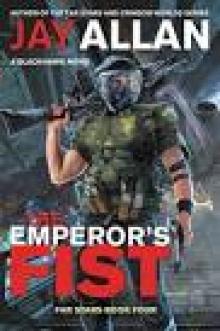 The Emperor's Fist
The Emperor's Fist Blood on the Stars Collection 1
Blood on the Stars Collection 1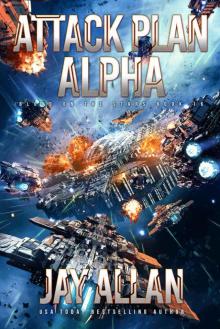 Attack Plan Alpha (Blood on the Stars Book 16)
Attack Plan Alpha (Blood on the Stars Book 16) BOB's Bar (Tales From The Multiverse Book 2)
BOB's Bar (Tales From The Multiverse Book 2) The Others
The Others Nightfall
Nightfall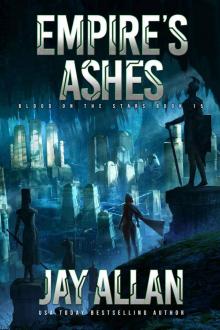 Empire's Ashes (Blood on the Stars Book 15)
Empire's Ashes (Blood on the Stars Book 15) Wings of Pegasus
Wings of Pegasus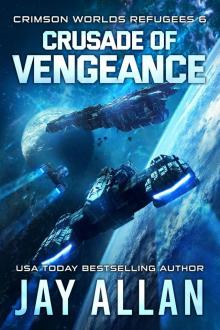 Crusade of Vengeance
Crusade of Vengeance The Last Stand
The Last Stand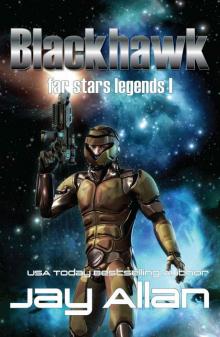 Blackhawk: Far Stars Legends I
Blackhawk: Far Stars Legends I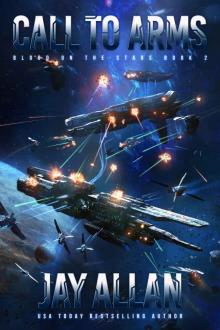 Call to Arms: Blood on the Stars II
Call to Arms: Blood on the Stars II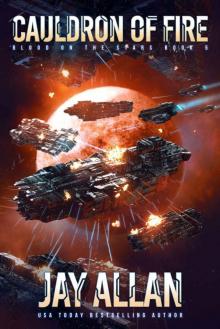 Cauldron of Fire (Blood on the Stars Book 5)
Cauldron of Fire (Blood on the Stars Book 5) Revenge of the Ancients: Crimson Worlds Refugees III
Revenge of the Ancients: Crimson Worlds Refugees III Crimson Worlds Successors: The Complete Trilogy
Crimson Worlds Successors: The Complete Trilogy The Grand Alliance
The Grand Alliance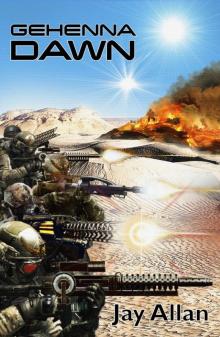 Portal Wars 1: Gehenna Dawn
Portal Wars 1: Gehenna Dawn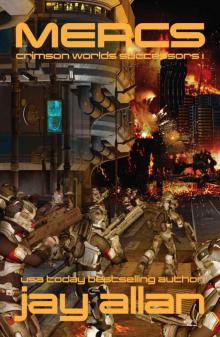 MERCS: Crimson Worlds Successors
MERCS: Crimson Worlds Successors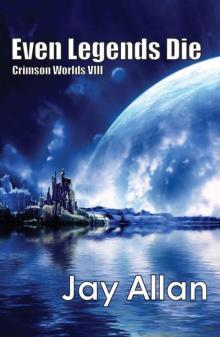 Crimson Worlds: 08 - Even Legends Die
Crimson Worlds: 08 - Even Legends Die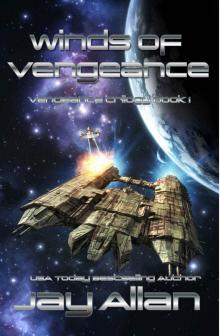 Winds of Vengeance
Winds of Vengeance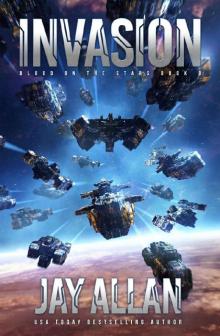 Invasion (Blood on the Stars Book 9)
Invasion (Blood on the Stars Book 9) A Little Rebellion (Crimson Worlds III)
A Little Rebellion (Crimson Worlds III)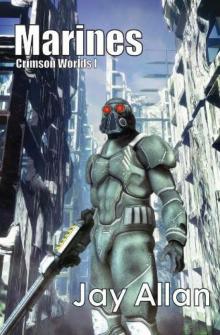 Marines
Marines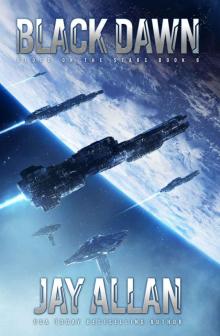 Black Dawn (Blood on the Stars Book 8)
Black Dawn (Blood on the Stars Book 8)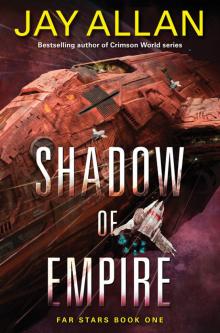 Shadow of Empire
Shadow of Empire Galactic Frontiers: A Collection of Space Opera and Military Science Fiction Stories
Galactic Frontiers: A Collection of Space Opera and Military Science Fiction Stories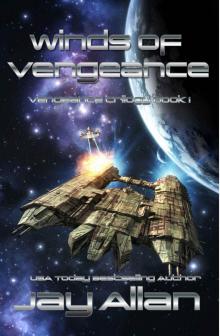 Winds of Vengeance (Crimson Worlds Refugees Book 4)
Winds of Vengeance (Crimson Worlds Refugees Book 4)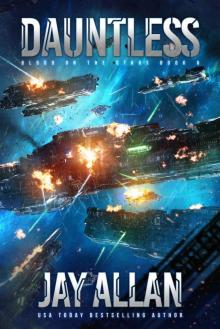 Dauntless (Blood on the Stars Book 6)
Dauntless (Blood on the Stars Book 6) Portal Wars: The Trilogy
Portal Wars: The Trilogy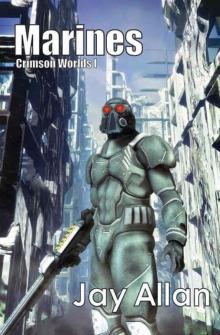 Marines cw-1
Marines cw-1 The Cost of Victory
The Cost of Victory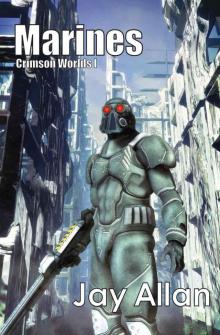 Marines (Crimson Worlds)
Marines (Crimson Worlds)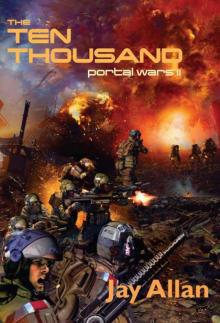 The Ten Thousand: Portal Wars II
The Ten Thousand: Portal Wars II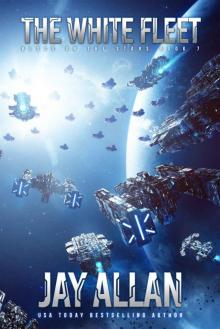 The White Fleet (Blood on the Stars Book 7)
The White Fleet (Blood on the Stars Book 7)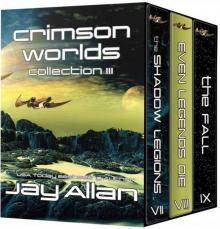 Crimson Worlds Collection III
Crimson Worlds Collection III The Black Flag (Crimson Worlds Successors Book 3)
The Black Flag (Crimson Worlds Successors Book 3) Tombstone
Tombstone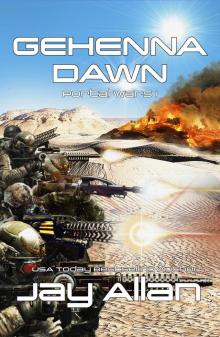 Gehenna Dawn
Gehenna Dawn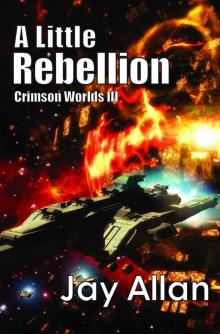 A Little Rebellion (Crimson Worlds)
A Little Rebellion (Crimson Worlds)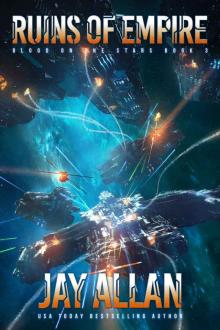 Ruins of Empire: Blood on the Stars III
Ruins of Empire: Blood on the Stars III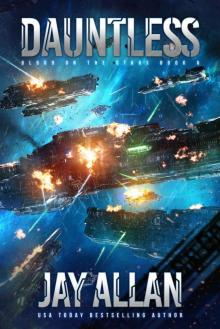 Dauntless
Dauntless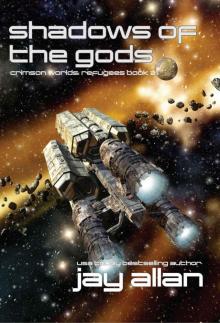 Shadows of the Gods: Crimson Worlds Refugees II
Shadows of the Gods: Crimson Worlds Refugees II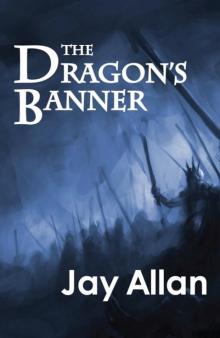 The Dragon's Banner
The Dragon's Banner Echoes of Glory (Blood on the Stars Book 4)
Echoes of Glory (Blood on the Stars Book 4)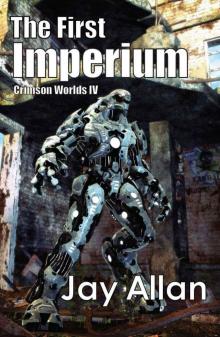 Crimson Worlds: 04 - The First Imperium
Crimson Worlds: 04 - The First Imperium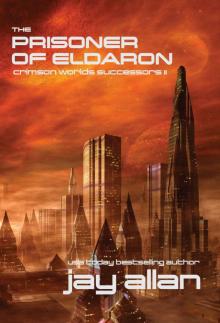 The Prisoner of Eldaron: Crimson Worlds Successors II
The Prisoner of Eldaron: Crimson Worlds Successors II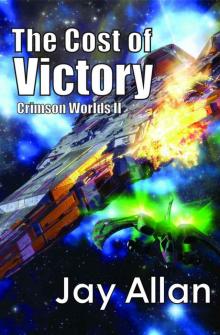 The Cost of Victory (Crimson Worlds)
The Cost of Victory (Crimson Worlds)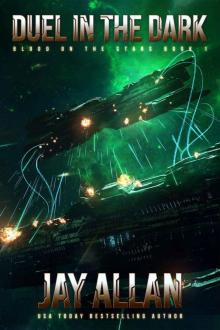 Duel in the Dark: Blood on the Stars I
Duel in the Dark: Blood on the Stars I Into the Darkness: Crimson Worlds Refugees I
Into the Darkness: Crimson Worlds Refugees I Crimson Worlds Refugees: The First Trilogy
Crimson Worlds Refugees: The First Trilogy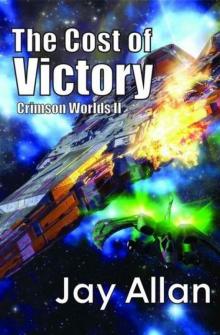 The Cost of Victory cw-2
The Cost of Victory cw-2 Stars & Empire 2: 10 More Galactic Tales (Stars & Empire Box Set Collection)
Stars & Empire 2: 10 More Galactic Tales (Stars & Empire Box Set Collection) Flames of Rebellion
Flames of Rebellion Stars & Empire: 10 Galactic Tales
Stars & Empire: 10 Galactic Tales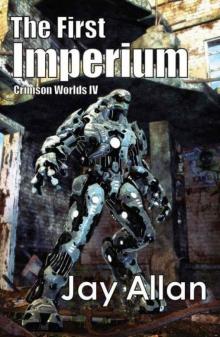 The First Imperium cw-4
The First Imperium cw-4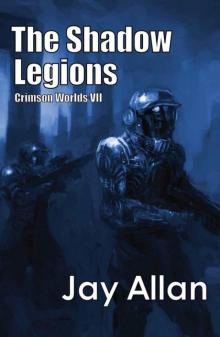 Crimson Worlds: 07 - The Shadow Legions
Crimson Worlds: 07 - The Shadow Legions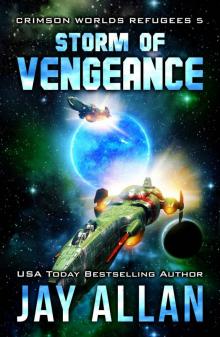 Storm of Vengeance
Storm of Vengeance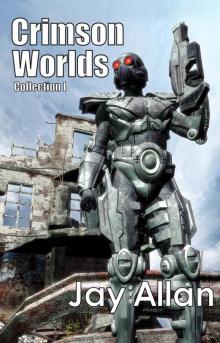 Crimson Worlds Collection I
Crimson Worlds Collection I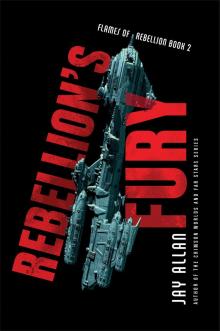 Rebellion's Fury
Rebellion's Fury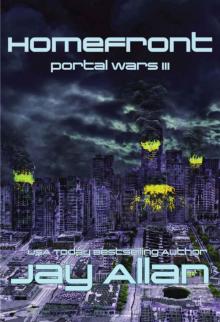 Homefront: Portal Wars III
Homefront: Portal Wars III Tombstone (crimson worlds)
Tombstone (crimson worlds) Crimson Worlds: Prequel - Bitter Glory
Crimson Worlds: Prequel - Bitter Glory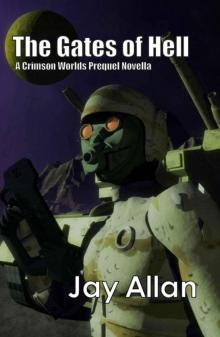 Crimson Worlds: Prequel - The Gates of Hell
Crimson Worlds: Prequel - The Gates of Hell The Fall: Crimson Worlds IX
The Fall: Crimson Worlds IX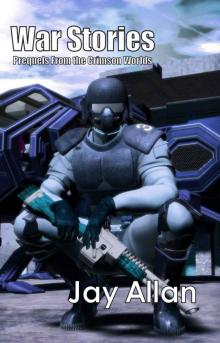 Crimson Worlds: War Stories: 3 Crimson Worlds Prequel Novellas
Crimson Worlds: War Stories: 3 Crimson Worlds Prequel Novellas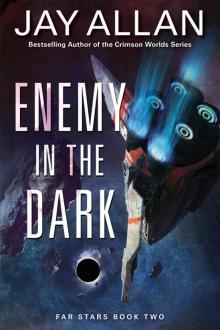 Enemy in the Dark
Enemy in the Dark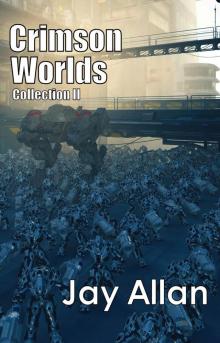 Crimson Worlds Collection II
Crimson Worlds Collection II